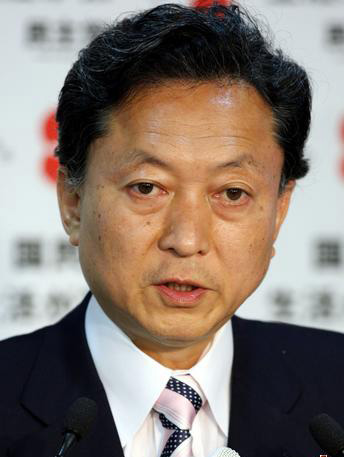Japan's aged finance minister is to quit due to poor health after weeks of exhausting wrangling over the budget, the Nikkei news agency said on Tuesday, a fresh blow for Prime Minister Yukio Hatoyama as he struggles with a frail economy and huge public debt, Reuters reported.
Hatoyama had said he wanted Hirohisa Fujii to stay on, but if he does go it could put the fiscal restraint championed by the 77-year-old lawmaker at risk and weigh on government bonds, though for now investors are reassured that bond issuance for the fiscal year from April is set.
"I want him to keep doing his best," Hatoyama told reporters after broadcaster NTV said Fujii -- who has high blood pressure -- had told Hatoyama he was worried he couldn't cope with long days of questioning in parliament, due to convene this month.
Nikkei, citing a ruling party lawmaker, said the government had decided to accept Fujii's resignation.
Hatoyama took office in September after his Democratic Party (DPJ) overturned almost five decades of unbroken rule by the Liberal Democrats, but his popular support has sagged in recent weeks due to his growing reputation as an indecisive leader.
Finding a successor for Fujii from within the inexperienced ranks of his party will be another test for Hatoyama ahead of a mid-year upper house election that will weaken the DPJ's ability to pass legislation if it loses.
"The market had a sense of trust in the government because of Fujii's leadership in compiling the budget," said Toshihiko Sakai, manager of foreign exchange trading at Mitsubishi UFJ Trust Bank.
"The budget is already put in shape, but a lack of Fujii's leadership could mean political instability in the future and is therefore negative for Japanese government bonds."
Kikuko Takeda, senior currency economist with BTM UFJ in London, said Fujii's resignation should not automatically translate into a higher yen.
"Fujii was considered to be serious about fiscal discipline, and so his resignation may further highlight the government's indebtedness. The key will be how JGBs (Japanese government bonds) react tomorrow morning, and the yen may take a cue from their movements."
Often serving as the voice of fiscal restraint, Fujii was the main proponent of sticking to a cap of around 44 trillion yen ($476.8 billion) on new bond issuance for the year from April as the government looks to contain a mountain of debt.
Were Fujii to stand down after just over three months in the job, Hatoyama would struggle to find a lawmaker with both Fujii's expertise in budgetary matters and the political clout needed to resist pressure to spend more on economic stimulus projects, which would inflate the already huge public debt.
"If Fujii were to step down, markets are likely to start worrying that his successor would call for expansive fiscal spending to achieve the government's growth target," said Seiji Adachi, senior economist at Deutsche Securities.
"Even if Fujii stays on, he may not be able to push for fiscal discipline further given his health problems."
POSSIBLE CANDIDATES
Fujii's two deputies, Yoshihiko Noda and Naoki Minezaki, are possibilities to replace him, as are other cabinet members such as National Strategy Minister Naoto Kan and Yoshito Sengoku, who is in charge of cutting waste from the national budget.
Fujii said earlier he was waiting for final results of medical tests after being hospitalized last week suffering from exhaustion, and that a decision on whether he should stay in the post should be made before parliament convenes later this month.
The results of the medical tests were likely this weekend, Jiji news agency said, citing sources.
Even if he stays in the post, health problems may cast doubt on whether Fujii is fit enough for a job that requires overseeing the world's second-largest economy, making frequent overseas trips and attending hours of debate in parliament.
"The concern in the market is whether there will be a delay in parliament deliberations on the budget," said Akitsugu Bandou, senior economist at Okasan Securities.
"It's better if a decision on whether he stays is made before parliament convenes. But it's also unclear whether there will be a smooth transition if a new person were to take over the job."
The government fears the economy could slide back into a recession this year as falling wages and persistent deflation dampen consumers' appetite to spend.
Japan approved on December 25 a record 92.3 trillion yen ($1 trillion) budget for 2010/11 that will increase the country's public debt that is nearing 200 percent of GDP.
($1=92.27 yen)






